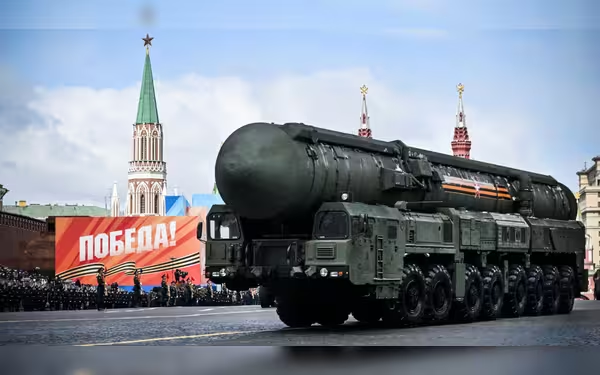Saturday, November 16, 2024 03:22 PM
Kremlin Warns West Over Nuclear Doctrine Changes
- Putin announces nuclear doctrine changes as a warning.
- Kremlin views Western support for Ukraine as a threat.
- US and EU leaders condemn Russia's nuclear rhetoric.
 Image Credits: arabnewspk
Image Credits: arabnewspkKremlin's changes to nuclear doctrine serve as a warning to the West amid ongoing Ukraine conflict and military support.
MOSCOW: In a significant development, President Vladimir Putin has announced changes to Russia's nuclear doctrine, which the Kremlin asserts are aimed at discouraging Western support for Ukraine. This announcement comes amid ongoing tensions between Russia and Ukraine, as well as the West's increasing military assistance to Kyiv. The Kremlin's stance is clear: any conventional attack on Russia, especially if backed by a nuclear power, will be viewed as a joint assault on the nation.
Kremlin spokesman Dmitry Peskov emphasized that the revisions serve as a "warning signal" to countries involved in supporting attacks against Russia. He stated that the changes reflect the potential consequences of such involvement, which could extend beyond nuclear weapons. This statement underscores the Kremlin's intent to deter Western nations from providing Ukraine with advanced weaponry that could be used to strike Russian territory.
Putin's remarks during a recent Security Council meeting highlighted a new level of seriousness regarding Russia's nuclear capabilities. He indicated that the revised doctrine outlines specific conditions under which nuclear weapons could be employed, particularly in response to a massive air attack. This ambiguity in language is likely designed to instill caution among Western allies, making them think twice before escalating their military support for Ukraine.
In response to Putin's statements, US Secretary of State Antony Blinken condemned the rhetoric as "totally irresponsible." He pointed out that many nations, including China, have previously expressed concerns about Russia's nuclear threats. Blinken's comments reflect a broader international unease regarding the potential for nuclear escalation in the ongoing conflict.
European Commission spokesman Peter Stano echoed these sentiments, labeling Putin's statements as a continuation of "irresponsible and unacceptable behavior." This reaction from Western leaders indicates a growing concern about the implications of Russia's nuclear posturing, especially as the conflict in Ukraine enters its third year.
As the situation unfolds, it is essential to recognize the broader context of the conflict. Ukraine has been actively striking Russian territory in retaliation for Moscow's attacks, and President Volodymyr Zelensky has been advocating for more advanced weaponry from Western allies. The Biden administration has so far refrained from granting permission for Ukraine to use American weapons for deep strikes into Russia, but the pressure is mounting.
In a recent meeting, President Biden announced additional military support for Ukraine, including new weapons deliveries. This ongoing support from the West is crucial for Ukraine as it seeks to defend itself against Russian aggression. However, the Kremlin's warnings about nuclear consequences add a layer of complexity to the situation.
The changes to Russia's nuclear doctrine serve as a stark reminder of the high stakes involved in the ongoing conflict. As both sides navigate this tense landscape, the potential for miscalculation remains a significant concern. The international community must remain vigilant and engaged, as the implications of these developments could resonate far beyond the borders of Ukraine and Russia. The world watches closely, hoping for a resolution that prioritizes peace and stability over escalation and conflict.













